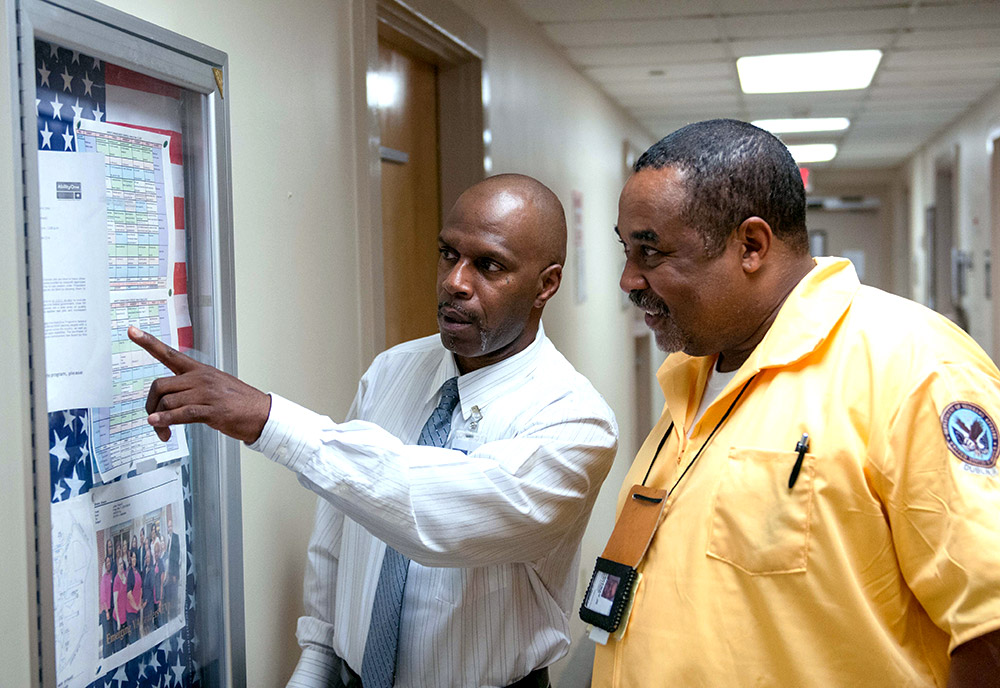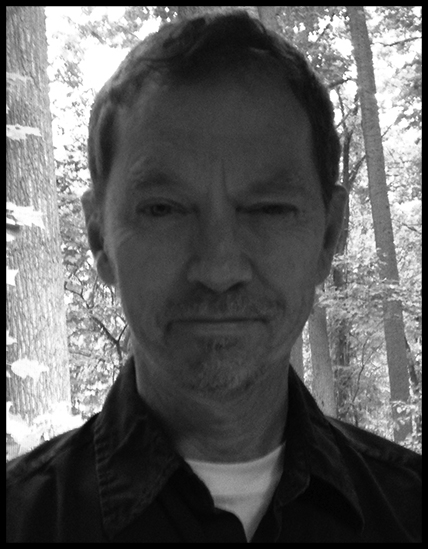
Formerly homeless Veteran James Mobley (left) works full-time at the same VA domiciliary in Dublin, Ga., where he spent nearly a year in recovery. (Photo/Greg Swars, Dublin VA)
Not too many homeless Veterans have masters’ degrees in theology and public administration. But then again, 53-year-old James Mobley isn’t your average guy.
“The last time I was in prison, I decided to get a master in theology because my spirit was broken,” he explained. “I studied theology because I wanted to heal my spirit.”
Mobley appears to be the kind of guy whose spirit shines brilliantly for a time but then, like a meteor streaking through the night sky, dissolves abruptly into darkness. “I’ve spent a total of 16 years in prison,” he said. “It’s kind of been up and down for me.”
In between three different stints in prison, all of them in New York, Mobley was busy furthering his education and holding good jobs in the social services field, primarily helping people struggling with drug or alcohol addiction.
“I liked being a counselor,” he said. “I like helping people. Up in New York, I was employed with a place that helped runaways. I was working with kids who were 14 to 21-years-old. I became a father figure to a lot of them. I started there as a case manager, then worked my way up to supervisor.”
“After three years on that job I relapsed and started drinking again,” he said. “I ended up back in jail.”
“My wife, who was down in Georgia, kept telling me to come down there,” he said. “She said it would change my life. So three years ago I moved to Georgia. I got a job at the transition house, working with homeless Veterans. I worked there for two years, but then I started drinking heavily again. I got a DUI.”
But this time around, Mobley somehow avoided jail time. Desperate and homeless, he found his way to the VA medical center in Dublin, Georgia.
“They put me in their homeless program at the domiciliary,” he said. “When I first got there I was reluctant to stay. And if it wasn’t for my social worker, Kimberly, I probably would have left. She was the person who kept me there.”
A Little Hope
“James did all the work; he worked hard at staying here,” said Kimberly Kralicky. “All I did was offer him support and hope.”
“When he first arrived here I could see he had potential,” said Dawn Kentish, domiciliary chief at the Dublin VA. “He was sort of all over the place at first…there were so many things that needed to be addressed.”
With the help of Kralicky, Kentish and others like them, a down-and-out Mobley dug deep and found the strength to stick with his treatment program. “When he hit 30 days of sobriety, he was so happy,” Kentish said. “And we were happy for him. We celebrated that achievement with him.”
“I spent nine months in the homeless program here,” Mobley said. “That’s where I learned I was suffering from PTSD, and that my PTSD had a lot to do with my depression. I never knew that before.”
Full Time Social Worker
As part of his recovery process, Mobley began doing some volunteer work at the hospital. In addition to his volunteer work, he’s now employed full-time as a social services aide at the same domiciliary where he spent nearly a year in recovery.
“I have a wonderful team around me,” he added, “and I listen to them. They helped me help myself. These are the people I can go to. I can talk to all of them and not feel judged.”
Perhaps the person who’s been on Mobley’s team the longest is his wife, Cherrietta. Despite the bumpy rollercoaster ride, the two are now together again, recently reunited. “We’ve been together 35 years,” Mobley said. “We grew up together in New York. She stuck with me through all of it. That’s my tough cookie.”
“Yeah, I’m a tough cookie,” Cherrietta said. “I stuck with him. I’ve known him forever, so underneath, I know he’s a real good man. He just needed somebody to love him, someone to tell him everything’s gonna be alright.”
To learn more about VA’s efforts to end Veteran homelessness, visit www.va.gov/homeless
For more information on how VA is helping Veterans with PTSD, visit www.ptsd.va.gov
This article was originally posted on VHA’s website.

Topics in this story
More Stories
The Social Security Administration is hoping to make applying for Supplemental Security Income (SSI) a whole lot easier, announcing it will start offering online, streamlined applications for some applicants.
Yusuf Henriques, an Army Veteran and former combat medic, is the founder and CEO of IndyGeneUS AI, a genomics company on a mission to improve health equity by increasing representation of women and racial minorities in clinical trials.
Online shopping scams are the riskiest scam for Veterans, with 77.3% of reports confirmed losing money when targeted by this scam.







This was a very inspiring article. Thank you for sharing.
Thank you for the wonderful and inspiring story of US Military Veteran, James Mobley. US Military veterans, in my opinion, should receive preferential treatment over all others in employment and education at the Federal, State, and private levels. US Military veterans should, also, receive protection from other types of discrimination and harassment. Otherwise, the concept presented in the film, “Star Ship Troopers”, should be promulgated through which the right to vote would only be granted to those who have served in the U.S. Military. Otherwise, the tragedy experienced by US Veterans of the War in Vietnam and subsequent wars will be repeated. Aristotle warned that mistreating military veterans in such a way and giving preferential treatment to non-veterans would, eventually, lead to the collapse of the state.
Great story thank you, & thank you to all of the homeless Veterans staff. All military Veterans in this country have a good heart & want to continue to do good after their discharge, however we must know that their are plenty of assistance @ the VA 24/7. The “VA IS OUR BROTHERS KEEPER”. God Bless You All
Sincerely,
U.S. Army NCO
Retired and Disabled Veteran
I was hired at Sepulveda VA hospital where I worked for 3-4 years as a fee based chaplain on the Protestant side of the house. I was enjoying my job when the catholic priest chief of Chaplin ( wrongfully fired me ). No one did a thing. My family suffered. He retired. My PTSD got real bad.
What can be done about this abuse from the administration ?
Disable Vet Homeless I have Been Homeless Since Jan 2014 me And My Family
We Are In Need of Help to Become Back Self Sufficent